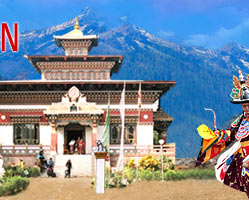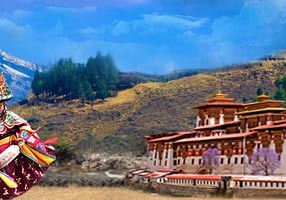Bhutanese have unique lifestyle, manners and customs that are still intact after thousands of years because of its continued policy of keeping itself isolated from the rest of the world. Religion has a big role in the life of the people of Bhutan. Social conventions of Bhutan are very much influenced by the country’s state religion. Buddhism and Bonism, the original religion of Tibet have become so integrated with Bhutanese culture that they have become almost inseparable. Most of the Bhutanese people lead an agrarian lifestyle. Men and women share equal rights and there are no rigid clan systems in the nation. You will see all Bhutanese citizens wear national dresses in public, which is made compulsory by law since 1990. Men wear robes called gho while women wear kira in bright colors with ornate brooches and a wraparound skirt.
It is illegal in Bhutan to sell or buy tobacco products and smoking in public places is banned too. The religious leaders of the country have always had much of their say in the political affairs of Bhutan and have been political leaders in the past too. So, the lifestyle conforms to the religious beliefs mostly. The country had isolated itself for years to preserve its uniqueness of culture and to keep its traditions alive but has only recently opening up to the outside world. Bhutanese government however controls the foreign influence with a keen eye and is trying hard to keep it under control. This is the reason the old-world feel in Bhutan is still intact. Bhutanese inherit strange and peculiar customs that have their origin in the country’s history and mythological legends and folk tales of the country.
Giant phalluses painted outside the homes of otherwise conservative and reserved Bhutanese represent the Divine Madman, who is believed to ward off evil spirits. Tipping is not very common in Bhutan and old people relish doma (betel nut) very much. Dogs are treated with reverence in Bhutan as they are considered to be the highest animal life form, with the best chance of being reborn as humans. Thus, you can see dogs run freely and noisily through Bhutanese villages. Keep in mind that the King and royal family is respected very much throughout Bhutan and you should avoid any criticisms or negative comments on them while conversing with the local people. Always pass sacred sites and objects such as mani stones, stupa and other religious objects with your right side nearest to the object. Prayer wheels should only be turned in a clockwise direction.
The Bhutanese people can perceive turning them in the wrong direction as a sign of disrespect. It is considered derogatory and disrespectful to sit on mani stones or stupa, so never do that. Before visiting any sacred site and temples, remember to remove your shoes and hats and wear respectful clothing. Though, it is not compulsory but it is customary to offer a small donation to the monks and Buddhist statues and idols at the monasteries as a sign of respect and is considered as a means of developing a generous and spacious mind. It is not only disrespectful but also illegal to smoke at monasteries and other public places.




